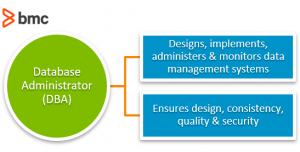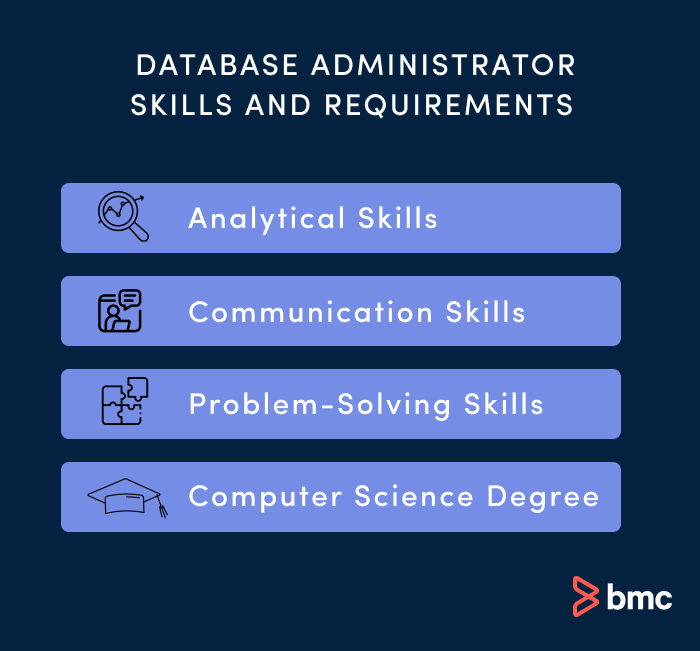The database administrator (DBA) plays a key role in many companies. Today’s most valuable companies are the ones that make the best use of data. The database administrator is key to unlocking that value.
The tasks of database administration in the management of data and IT systems is a critical exercise, particularly in a time where data privacy regulation is a hot topic.
Database administrator roles and responsibilities have evolved over time, given the evolution of data types and sources, along with data storage options. Let’s review the current status of this career field and see what the future holds for database administrator roles.

What is a database administrator (DBA)?
A database administrator, or DBA for short, designs, implements, administers, and monitors data management systems and ensures consistency, quality, security, and compliance with rules and regulations.
The role of DBA has evolved into a mission-critical function. A DBA in database management involves the installing, configuring, monitoring, maintaining, and improving the performance of databases and data stores, according to Skills Framework for the Information Age–SFIA 8. A solution architect may design the overall framework or structure of the databases, but the job of implementing and maintaining belongs to DBA roles.
(Read our data architecture explainer.)
Where do database administrators work?
The database administrator role has a place in nearly every organization, to at least some degree. The industries that employ the most people in database administration include tech fields such as computer systems design and information management.
Many also work in information-intensive businesses such as finance, insurance, and educational services. The management of companies and enterprises as a whole also drives the demand for DBAs.
Database administrator responsibilities
Now that we have defined what a database administrator is, we can take a deeper dive into the responsibilities that might be part of a database administrator job description. The day-to-day activities that a DBA performs may include:
- Creating and maintaining database standards and policies.
- Supporting database design, creation, and testing activities.
- Managing the database availability and performance, including incident and problem management.
- Administering database objects to achieve optimum utilization.
- Defining and implementing event triggers that will alert on potential database performance or integrity issues.
- Performing database housekeeping, such as tuning, indexing, etc.
- Monitoring usage, transaction volumes, response times, concurrency levels, etc.
- Implementing security measures and frameworks, while ensuring compliance.
- Identifying, reporting, and managing database security issues, audit trails, and forensics.
- Designing database backup, archiving, and storage strategy.
- Installing upgrades and patches to various apps.
Are you ready to harness the power of data? See how DataOps with BMC can transform your analytics. ›
What is the average wage for DBAs?
Qualified people in this field, depending on the specifics of the various database administrator roles and the DBA tasks they handle, tend to earn on the high side on average. The median salary for a database administrator was $117,450 in May 2023. Those working in companies in the computer systems sector earned almost twice as much as those in educational services.
Database administrator requirements and education

At a bare minimum, database administrator job descriptions seek people who:
- Have a background in computer science, information technology, or engineering.
- Are conversant with structured query language (SQL) and relevant database technologies (whether proprietary or open source.)
- Understand coding and service management to some degree.
Relevant database technologies include SQL Server, MySQL, Oracle, IBM Db2, and MongoDB, among others. You don’t have to be certified in all of them, but a working knowledge of a few of them is required.
The European e-Competence framework (e-CF) outlines five associated competencies that the DBA should have. These competences are all proficiency level 3, on a scale of 1 to 5:
| e-CF Area | e-CF Competence | Level 3 |
|---|---|---|
| Build | Application Development | Acts creatively to develop applications and to select appropriate technical options. Accounts for others’ development activities. Optimizes application development, maintenance, and performance by employing design patterns and by reusing proven solutions. |
| Component integration | Accounts for own and others’ actions in the integration process. Complies with appropriate standards and change control procedures to maintain integrity of the overall system functionality and reliability. | |
| Run | Change Support | Ensures the integrity of the system by controlling the application of functional updates, software, or hardware additions and maintenance activities. Complies with budget requirements. |
| Information and Knowledge Management | Analyzes business processes and associated information requirements and provides the most appropriate information structure. | |
| Manage | Information Security Management | Evaluates security management measures and indicators and decides if compliant to information security policy. Investigates and instigates remedial measures to address any security breaches. |
You will need additional soft skills for success across database administrator roles and responsibilities:
- Business awareness and understanding of business requirements of IT
- Excellent problem-solving and analytical skills
- Good communication, teamwork, and negotiation skills
- Good organizational skills
- Flexibility and adaptability
- Excellent business relationship and user support skills
DBA career development
In mapping your career development plan, the following four areas of responsibility are defined in the Skills Framework for the Information Age (SFIA 8:
Level 2 Database Administrator (Assist)
You will work under the guidance of someone with more experience, but will have some discretion in planning some of your work and resolving some issues. In this role, you will:
- Assist in database support activities.
- Collaborate with team members in addressing user needs.
- Contribute to issue resolution and discussions.
- Identify your own development opportunities and take advantage of chances to learn more.
Level 3 Database Administrator (Apply)
As you progress in experience and seniority, you will begin to work with greater autonomy. You will meet agreed milestones and will make judgments about responding to issues and when to escalate them to a higher level. DBA tasks at this level include:
- Performing standard database maintenance and administration tasks.
- Usings database management system software and tools to collect performance statistics.
- Interacting with customers, suppliers, and partners.
- Collaborating with others on the team, making substantive contributions.
Level 4 Database Administrator (Enable)
With an understanding of the general direction of your team, you have discretion in deciding what issues and assignments to prioritize. You will manage plans and schedules and keep track of how your team is meeting objectives and targets. People in this role:
- Develop and configure tools to enable automation of database administration tasks.
- Monitor performance statistics and create reports.
- Identify and investigate complex problems and issues and recommend corrective actions.
- Perform routine configuration, installation, and reconfiguration of database and related products.
Level 5 Database Administrator (Ensure, Advise)
You will need to be a self-starter and self-manager in this leadership role. You will be making decisions about assigning work, keeping to deadlines, and managing the budget. A database administrator job description for a DBA at this level may specify that they:
- Identify, evaluate, and manage the adoption of database administration tools and processes, including automation.
- Develop and maintain procedures and documentation for databases.
- Contribute to the setting of standards for definition, security, and integrity of database objects and ensure conformance to these standards.
- Manage database configuration including installing and upgrading software and maintaining relevant documentation.
- Monitor database activity and resource usage.
- Optimize database performance and plan for forecast resource needs.
Experience the power of efficient data workflow orchestration with Control-M! ›
Outlook for DBAs
Demand for data continues to explode and evolve. Jobs in this field are expected to grow by 8% between 2022 and 2032.
The idea of information organized in a logical framework is giving way to unstructured data in the form of text, images, sensor information, audio, and videos. Data generated from more sources, such as mobile devices, ecommerce, internet of things (IoT), artificial intelligence (AI), and social media.
The result is that the title of a “database administrator” is morphing into a “data administrator,” who manages structured (database) and unstructured (big data) data sets.
Since most digital organizations are no longer restricted to transactional data only, the modern DBA must be conversant with file, block and object storage solutions.
And because of the sheer volume of data, as well as the growing reliance on AI and machine learning solutions for data processing, most data is now stored in the cloud. You will need expertise in cloud architectures and technologies, including data lakes and big data solutions like Hadoop.
The rise of DevOps methodology as the preferred model for end-to-end product management means that you need a broad base of knowledge across several areas of specialization. You will likely work in an autonomous environment with platform engineers to develop automated self-service tools. Software developers can use the tools you develop to create the data solutions they require for their applications.
A career in database administration will also require you to add software engineering capabilities to your repertoire.
Leverage automation powered by AI and machine learning to provide world-class data management with BMC AMI Data. ›
DBAs must acknowledge data privacy
Protecting data has become the focus of regulation across the world, with global enterprises being subject to a web of complex and intersecting laws and requirements.
Failure to comply with regulations, such as the sweeping GDPR laws that protect user/customer privacy rights, puts the reputation and data of your organization at risk and exposes your enterprise to hefty fines. For this reason, data management is now a critical corporate governance imperative.
To better comply with the cybersecurity challenge, various cybersecurity frameworks such as CISA, NIST, and ISO 27001, and services that automate compliance have emerged. An expanding DBA role includes making sure your organization satisfies their requirements, is set up to prevent cybercrimes, can handle audits, and can handle demands for documentation.
Related reading
- BMC Machine Learning & Big Data Blog
- Top DBA Shell Scripts for Monitoring the Database
- What Is a Database Reliability Engineer (DBRE)?
- DataOps Explained: Understand how DataOps leverages analytics to drive actionable business insights
- Are IBM® z/OS® Db2® DBAs Vanishing?
- Today’s Best IT/Tech Certifications: A Complete Guide







